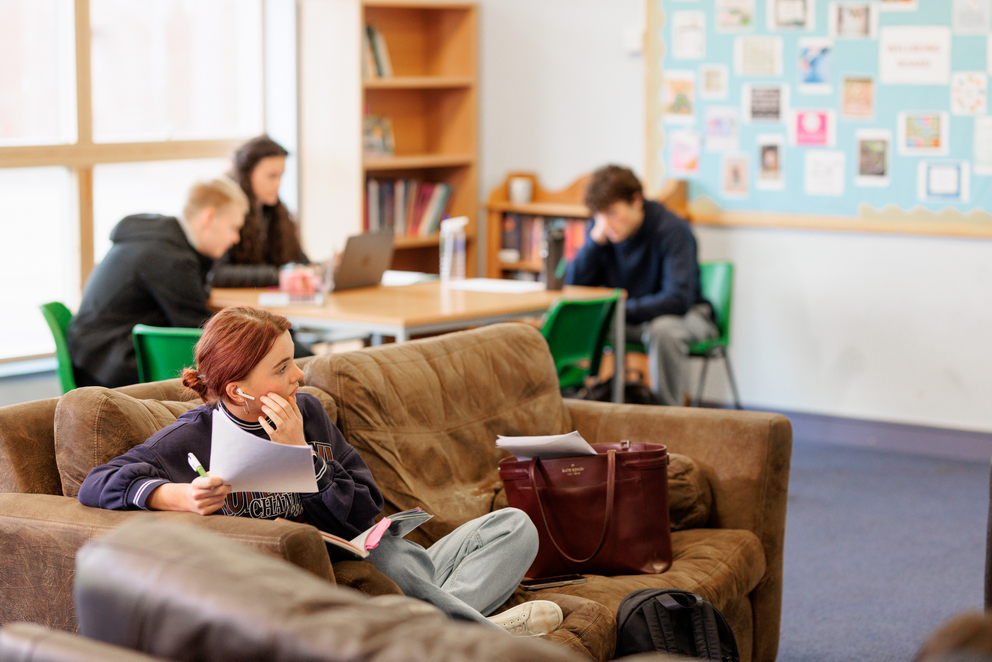Our values champion inclusivity and kindness and aim to put pupils on the right path, providing opportunity and hope that students can take into their adult lives. They are grounded in community and built on the foundation of our faith.
The curriculum based Religious Education provision allows us to promote the spiritual and moral growth of our students as they learn to treat themselves and other people in the way that Jesus would want. A full range of lessons in other subjects including History, Geography and Science and dedicated tutor time and assemblies help us to achieve this objective in all aspects of their academic lives.
Looking specifically at the fundamental British values, at The Catholic High School, Chester we promote these in the following way:
Every student has the power to make a difference by choosing a member of the ‘Student Voice’. This is a group of student ambassadors that represent their peers from Year 7 to 13. They meet on a regular basis to discuss a number of school issues affecting the student community. Our Head Boy and Head Girl are also elected through a thoroughly democratic process, offering students the opportunity to make a real difference, whilst taking pride in their ability to truly have their voice heard.
We also encourage a democratic approach in our curriculum. For example, during GCSE Religious Education, students learn how citizens can influence decision-making through the democratic process. They assess the advantages of a democracy in comparison to a dictatorship, gaining an awareness of how historical leaders have implemented both and the differing experiences of their people. Through study of WWII and the Holocaust in History lessons, students learn of the worst consequences of ignoring the rights of minorities.

Students are made aware of the importance of rules, ensuring that they know that they are in place for their own benefit (to protect and help them) and ingraine an ethos of respect for all. They learn of the difficulties that arise when rules are not followed. Students have rules of work as well as rules on behaviour. To reinforce this, In Year 11 RE, students learn “Rights and Responsibilities”and “Crime and Punishment” Nurturing an appreciation for the responsibilities that accompany our rights and the importance of respecting the Law.
We encourage students to be independent and bold in making their own decisions and to contribute willingly in all class discussion. Our classrooms are friendly, welcoming environments that allow for respectful dialogue between students. It is consistently reinforced to our pupils the importance of thinking about others and treating others how they would like to be treated – encouraging a mutually supportive community. In Year 9 Religious Education, pupils study how they make moral decisions and look at the consequences of decision making. In Year 11 RE GCSE students explore an introduction to Human Rights – Progressing to develop this further in their studies in Year 13.
We recognise the importance of Religious Education to develop young peoples’ sense of value and identity, empowering each child with a sense of belonging within society. Pupils are encouraged to show care and respect to others and develop a sense of value of other cultures and a respect for moral and legal obligations, fairness and justice.
Our curriculum allows students to gain an appreciation for a number of different cultures and religions. In Year 7, our young people study the history and practices of Judaism, Year 8 students learn about different Christian denominations, Year 9 features an in-depth study of Islam and Year 11 students re-visit the beliefs and values of Judaism once again.
World Religions are also examined in General RE in the Sixth Form. In addition festivals of light (Judaism, Christianity and Hinduism) are studied. In Year 10 students explore Religion and Community Cohesion as part of their GCSE course. This year, Year 9 students visited a mosque, Hindu temple and synagogue.
We provide pupils with learning opportunities through which they can be taught the knowledge, skills and understanding needed for them to take responsibility for themselves, show respect for others and to develop the self-awareness and confidence needed to maximise their individual potential. Our school ethos and behaviour policy establishes how we expect each pupil to respect the feelings of others. Religious Education days in Year 7, 8 and 9 also encourage mutual respect by students – exploring topics such as ‘I am special in God’s eyes’ and ‘Do not label me’. In addition, each year the school holds a one day ‘special’ day that has previously focused on ‘Respect’ and ‘Love your neighbour and yourself’.